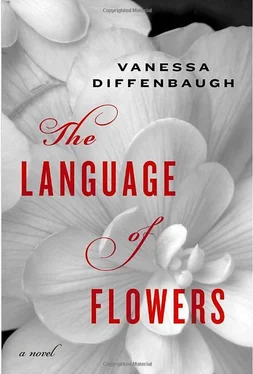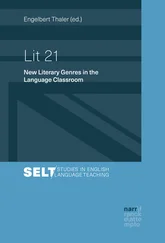“What do you mean, ‘nonnegotiable’?” I asked. I took a sip of peppermint tea, swallowed it, and grimaced, waiting for my stomach to settle.
“It means there’s only one definition, one meaning, for every flower. Like rosemary, which means—”
“Remembrance,” I said. “From Shakespeare, whoever that is.”
“Yes,” said Elizabeth, looking surprised. “And columbine—”
“Desertion.”
“Holly?”
“Foresight.”
“Lavender?”
“Mistrust.”
Elizabeth put down her gardening tools, took off her gloves, and knelt down next to me. Her eyes were so penetrating, I leaned back until my lawn chair started to tip backward, and Elizabeth’s hand flew out to clutch my ankle.
“Why did Meredith tell me you couldn’t learn?” she asked.
“Because I can’t,” I said. She took hold of my chin and turned my face until she could look directly into my eyes.
“Not true,” she said simply. “Four years of elementary school and you haven’t learned simple phonics, Meredith warned me. She said you’d be put in special education, if you could make it at a public school at all.”
In four years I’d done kindergarten twice and second grade twice. I wasn’t faking inability; I’d just never been asked. After the first year, my reputation of silent volatility was such that I was isolated from every class I entered. Stacks of photocopied worksheets taught me letters, numbers, simple math. I learned to read from whatever picture books slipped out of my classmates’ backpacks or I stole from classroom shelves.
There had been a time when I believed school might be different. My first day, sitting at a miniature desk in a neat row, I realized the chasm between me and the other children was not visible. My kindergarten teacher, Ms. Ellis, spoke my name softly, with emphasis on the middle syllable, and treated me like everyone else. She partnered me with a girl who was tinier than I was, her thin wrists brushing mine as we walked in line from the classroom to the playground and back again. Ms. Ellis believed in feeding the brain, and every day after recess she placed a paper cup with a sardine on top of each desk. After we ate our sardine, we were to flip the cup upside down to see the letter written on the bottom. If we could say the letter’s name and sound, and think of a word that started with the letter, we could have a second sardine. I memorized all the letters and sounds the first week and always got a second sardine.
But five weeks into school Meredith placed me with a new family, in a different suburb, and every time I thought of the slippery fish, I angered. My anger flipped desks, cut curtains, and stole lunch boxes. I was suspended, moved, and suspended again. By the end of that first year, my violence was expected, my education forgotten.
Elizabeth squeezed my face, her eyes demanding a response.
“I can read,” I said.
Elizabeth continued to search my face, as if she was determined to dig out every lie I had ever told. I shut my eyes until she released me.
“Well, that’s good to know,” she said. She shook her head and went back to gardening, slipping on her gloves before dropping into shallow holes the plants I’d uprooted. I watched her work, replacing the topsoil and patting gently around each trunk. She looked up when she finished. “I’ve asked Perla to come over to play. I need a rest, and it would be good for you to make a friend before school starts tomorrow.”
“Perla won’t be my friend,” I said.
“You haven’t even met her!” Elizabeth said, exasperated. “How do you know if she’ll be your friend or not?”
I knew Perla would not be my friend because I had never, in nine years, had a friend. Meredith must have told Elizabeth this. She’d told all my other foster mothers, and they warned the children in their homes to eat quickly and sleep with their Halloween candy tucked deep inside their pillowcases.
“Now come with me. She’s probably already waiting by the gate.”
Elizabeth led me through the garden, to the low white picket fence at the far edge. Perla leaned against it, waiting. She was close enough to have heard every word we said, but she didn’t look upset, just hopeful. She was only an inch or two taller than I was, and her body was soft and round. Her T-shirt was too tight and too short. Lime-colored fabric stretched across her stomach and ended before the waistline of her pants began. Deep red lines circled her arms where the elastic bands of her cap sleeves had been, before they inched up and got lost in her armpits. She dug out the elastic bands and pulled down her sleeves one at a time.
“Good morning,” Elizabeth said. “This is my daughter, Victoria. Victoria, this is Perla.” The sound of the word daughter made my stomach hurt again. I kicked dust at Elizabeth until she stepped on both my feet with her right shoe, her fingers clamping down on the back of my neck. My skin burned under her touch.
“Hi, Victoria,” said Perla shyly. She picked up a heavy black braid from where it rested on her shoulder and chewed on the already-wet ends.
“Good,” said Elizabeth, as if Perla’s quiet words and my stubborn silence had established something. “I’m going inside to rest. Victoria, stay out here and play with Perla until I call you.”
Without waiting for a response, she walked into the house. Perla and I, alone, stared at the ground. After a time, she reached out hesitantly and touched the tip of my wrapped hands with a thick finger. “What happened?”
I pulled at the gauze with my teeth, all at once desperate to use my hands again. “Thorns,” I said. “Unwrap them.”
Perla pulled at the edges of the tape, and I shook loose of the material. The skin, uncovered, was pale and wrinkled, the scabs small, dry circles. I picked at the edge of a scab with a fingernail, and it flaked off easily, fluttering to the ground.
“We’ll be in the same class at school tomorrow,” Perla said. “There’s only one fourth grade.”
I didn’t respond. Elizabeth thought I would start school. But she also thought I would be her daughter, and thought she could force me to have a friend. About all of this, she was wrong. I walked toward the garden shed. Perla’s heavy footsteps followed. I didn’t know what I would do, but suddenly I wanted Elizabeth to understand exactly how wrong she’d been about me. Snatching a knife and a pair of clippers from a shelf by the shed, I crept around the side of the garden.
On the other side of the almond tree, I followed a pattern of gray-and-green succulents until they faded into gravel. There, at the place the dusty dirt road collided with the lush garden, was an enormous, tangled cactus. It was bigger than Meredith’s county car, and the trunk was brown and scabby-looking, as if it had been cut over and over again by its own spines. Each branch was built like a collection of flat hands growing one out of the other, right, then left, then right again, so that each branch was balanced enough to stand straight and tall.
I knew what I would do.
“Nopales,” Perla said, when I pointed to the cactus. “Prickly pear.”
“What?”
“It’s a prickly pear; see the fruit on top? In Mexico, they sell them at the market. They’re good, as long as you peel them well.”
“Cut it down,” I ordered.
Perla stood still. “What? The whole thing?”
I shook my head no. “Just that branch, the one with all the fruit. I want it, to give to Elizabeth. But you have to do it, or I’ll hurt my hands.” Perla still didn’t move but looked up at the cactus, twice as tall as she was. Flaming red fruit grew like swollen fingers on top of each flat palm. I shoved the knife in her direction, its dull blade pointed low toward her abdomen.
Читать дальше












